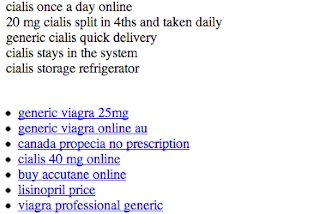Aleyda Solis voted SEO Personality of the year
After a mad week of campaigning, bribery (not for me by the way – you know who you are ), and crowdsourcing – and over 2750 votes being case, we finally have a winner, and with it a years free access to the Searchmetrics Essentials Plus suite. Its been a very close run thing – […]
Reclaiming Lost iOS Search Traffic
Have you noticed that direct traffic year over year is through the roof? Maybe you scratched your head, wrinkled your brow and chalked it up to better brand recognition. In reality, no such thing happened. What is happening is search traffic from iOS is being attributed to direct traffic instead. Your organic search numbers are […]
Reclaiming Lost iOS Search Traffic is by AJ Kohn, originally posted on Blind Five Year Old.
Update on festive European SEO Personality 2012
Its now been just under a week since voting commenced on our festive SEO personality awards, and it would appear that that some people are taking this awards ceremony. To reflect this our friends at SearchMetrics are now sponsoring the vote – with the winner now receiving a years access to Searchmetrics Essentials+. To boot, […]
Local Search Steel-Cage Match: Google+ Local v. Apple Maps v. Facebook Nearby v. Everyone Else
Just caught Greg’s piece on Facebook’s new mobile local search feature: Facebook Gets Into Local Search with Facebook Nearby for iOS & Android. While I don’t expect Facebook Nearby to stay ad-free forever, with the entry of Facebook Nearby and Apple Maps, both ad-free, I’d say 2012 has been the most interesting year in the Local […]
The post Local Search Steel-Cage Match: Google+ Local v. Apple Maps v. Facebook Nearby v. Everyone Else appeared first on Local SEO Guide.
Webmaster Tools verification strategies
Webmaster level: all
Verifying ownership of your website is the first step towards using Google Webmaster Tools. To help you keep verification simple & reduce its maintenance to a minimum, especially when you have multiple people using Webmaster Tools, we’ve put together a small list of tips & tricks that we’d like to share with you:
- The method that you choose for verification is up to you, and may depend on your CMS & hosting providers. If you want to be sure that changes on your side don’t result in an accidental loss of the verification status, you may even want to consider using two methods in parallel.
- Back in 2009, we updated the format of the verification meta tag and file. If you’re still using the old format, we recommend moving to the newer version. The newer meta tag is called “google-site-verification, and the newer file format contains just one line with the file name. While we’re currently supporting ye olde format, using the newer one ensures that you’re good to go in the future.
- When removing users’ access in Webmaster Tools, remember to remove any active associated verification tokens (file, meta tag, etc.). Leaving them on your server means that these users would be able to gain access again at any time. You can view the site owners list in Webmaster Tools under Configuration / Users.
- If multiple people need to access the site, we recommend using the “add users” functionality in Webmaster Tools. This makes it easier for you to maintain the access control list without having to modify files or settings on your servers.
- Also, if multiple people from your organization need to use Webmaster Tools, it can be a good policy to only allow users with email addresses from your domain. By doing that, you can verify at a glance that only users from your company have access. Additionally, when employees leave, access to Webmaster Tools is automatically taken care of when that account is disabled.
- Consider using “restricted” (read-only) access where possible. Settings generally don’t need to be changed on a daily basis, and when they do need to be changed, it can be easier to document them if they have to go through a central account.
We hope these tips help you to simplify the situation around verification of your website in Webmaster Tools. For more questions about verification, feel free to drop by our Webmaster Help Forums.
Posted by John Mueller, Webmaster Trends Analyst, Zurich
How to Obfuscate And Misdirect an Algo Update
Sharing is caring!
Please share :)
Embed code is here.
If you find the following a bit hard to read due to font size, a wider version is located here.
Categories: google
The ‘Scam’ Site That Never Launched
(A case study in being PRE negatively seo’ed)
Well it has been a fun year in search. Having had various sites that I thought were quality, completely burnt by Google since they started with the Penguins and Pandas and other penalties, I thought i would try something that I KNEW Google would love….. Something dare I say would be “bulletproof.” Something I could go to bed, knowing it would be there the next day in Google’s loving arms. Something I could focus on and be proud of.
Something I could focus on and be proud of.
Enter www.buymycar.com, an idea I had wanted to do for some time, where people list a car and it gets sent to a network of dealers who bid on it from a secure area. A simple idea but FAR from simple to implement.
Notes I made prior to launch to please Google and to give it a fighting chance were:
- To have an actual service and not to be an affiliate. Google crushed my affiliate sites and we know they are not fond of them as they want to be the only affiliate I think.
- To make sure the content was of a high quality. I took this so seriously that we actually made a point of linking out to direct competition where it helped to do so. This was almost physically painful to do! But I thought I would start as I meant to go on. I remember paying the content guy that helps me, triple his normal fee to go above and beyond normal research for the articles in our “sell my car” and “value my car” sections.
- To make the site socially likeable. I wanted something that people would share and as such to sacrifice profits in the short term to get it established.
- To give Google the things it loves on-site. Speed testing, webmaster tools error checking (even got a little well done from Google for having no errors, bless), user testing, sitemaps for big G to find our content more easily, fast hosting, letting it have full access with analytics…
- TO NEVER, EVER UNDER ANY CIRCUMSTANCES PAY FOR A LINK. Yes, I figured I would put all the investment into the site and content this time. If it went how I had hoped perhaps I could find the holy grail where site’s link to us willingly without a financial incentive! A grail I had been chasing for some years. Could people really link out without being paid? I had once heard a rumour it was possible and I wanted to investigate it……
Satisfied I had ticked all the boxes from hours of Matt Cutts video’s and Google guidelines documents, I went to work and stopped SEO on all my smaller sites that were out of favour. I was enjoying building what I had hoped would be a useful site and kicked myself for not having done so sooner. I also thanked Google mentally for being smart enough now to reward better sites.
Fast forward 4 months of testing and re testing and signing up car dealers across the country and I decided to do a cursory check to see if anyone had liked what I was building and linked to it. I put my site into ahrefs.com and to my surprise, 13,208 sites had!! What was also nice was that all of them had used the anchor text “Buy My Car Scam” and had been so kind as to give me worldwide exposure on .ru, .br and .fr sites in blog comments amongst others. 
In seriousness, this was absolutely devastating to see.
A worried competitor had obviously decided I was a threat and to nip my site in the bud with Google and attack it before it had even fully started. The live launch date was scheduled for January 7th, 2013! I was aware of negative SEO from other sites I had lost but not in advance of actually having any traffic or rankings. Now I was faced with death by Google rankings to look forward to before it had any rankings, add to that my site being cited as a scam across the Internet before it launched!
My options were immediately as follows:
- Go back and nuke the likely candidates in Google who had sabotaged me. Not really an option as I think it is the lowest of the low.
- Start trying to contact 13,000+ link owners to ask for the links to be removed. When I am heavily invested in this project anyway and have a deadline to reach, this was not an option. Also, Xrummer, Scrapebox or other automated tools could send another 13,000 just as easily in hours for me to deal with.
- Disavow links with Google. To download all the links, disavow them all and hope that Google would show me mercy in the few months Matt Cutts said it takes to get to them all removed.
- Give up the project. Radical as this may sound, it did go through my mind as organic traffic was a big part of my business plan. Thankfully I was talked out of it and it would be “letting them win.”
I opted for number 3, the disavow method but wondered what would happen if I kept being sent 10’s of thousands more links and how a new site can actually have any protection from this? To set back a site months in its early stages is devastating to a new on-line business. To be in a climate where it is done prior to launch is ridiculous. 
Had I fired back at future competitors as many suggested I did, there would be a knock on effect that makes me wonder if in the months to come, everyone will be doing it to each other as routine. Having been in SEO for years I always knew it was possible to sabotage sites but never thought it would become so common and before they even ranked!
Robert Prime is a self employed web developer based in East Sussex, England. You can follow him on Twitter at @RobertPrime.
Our Looking into the Crystal Ball of 2013 Predications Post
It’s hard to believe it is the middle of December and a whole year has blown by. To say 2012 was an interesting year would be an understatement, one thing is for sure, it was never dull!
Some of the SEOBook Moderators and I want to share what we feel will be hot (or not) in 2013, we have a diverse mixture of topics, opinions and practical marketing tactics for you to consider. First up is our fearless leader Aaron Wall!
Aaron Wall
Google Verticals
I believe we’ll see additional Google verticals launched (soon) and they’ll be added to the organic search listings. My guess is that (now that the advisor ad units are below AdWords) we can expect to see Google seriously step into education & insurance next year. I also expect them to vastly expand their automotive category in 2013.
SEO’s Move On
Tired by the pace of change & instability in the search ecosystem (along with the “2 books of guidelines” approach of enforcement in the search ecosystem), many people who are known as SEOs will move on in 2013. Many of these will be via acquisitions, and many more will be due to people simply hanging it up & moving on.
Rebranding Away From SEO
A company in the SEO niche that has long been known as an SEO company will rebrand away from the term SEO. After that happens, that will lead to a further polarization of public discourse (where most anything that is effective and profitable gets branded as being spam), only further fueling #2.
Geordie Carswell from Clearly Canadian (err, we mean here)
Adwords
Regarding Adwords, Google will aggressively dial up Quality Scores on keywords that have languished in activity due to low-QS but haven’t yet been deleted by advertisers. They seem to have given Quality Scores a bump across the board in Q4, bringing in unexpected increases in traffic and cost to advertisers who weren’t aware ‘dormant’ keywords were even still in their accounts. It’s a fantastic revenue generator almost on-demand for Google if the quarterly numbers aren’t looking good.
Peter DaVanzo (aka Kiwi)
Building Brand
More focus on building brands i.e. the people behind the site, their story, their history.
This is to encourage higher levels of engagement, leading to increased loyalty. Making the most of the traffic we already have
Eric Covino (aka vanillacoke)
SEO Diversifies
I think the industry will continue to become more divisive as more people either get out or go more underground and those that continue to remain overly-public will continue to invent language to serve their own commercial purposes while chastising those who do not fall in line; labeling these folks as spammers and bad for the industry in desperate attempts at differentiation so they can continue to try and sell to brands and the lower part of the consumer pyramid (read: mindless sheep)
There will be exceptions where the company will do and probably continue to do really well, but largely those who try and move from being pure SEO agencies to full service [insert new term here] ad-type agencies will fail at delivering real value to their clients. These people will resort to more outing and public spam report filings despite their amusing posts on how they are “different” and “clean”. I believe this will spawn a return of enterprise-level SEO services to competent SEO’s and SEO firms but not to the “point, link, report ranking agencies”. I believe the latter will die a faster death in 2013. Technical proficiency in SEO will become more and more valuable as well, especially if enterprise-level SEO returns as I think it will.
SEO Pricing Structures Will Change
A fractured search landscape where data is harder to come by (not provided, rank checking issues, mobile disruption) in addition to frequent algo shifts and confusion with local rankings will make low-cost SEO much harder to justify and measure, especially in the local area. These issues, coupled with the rising cost of doing business online, will make low to even moderate budget SEO (really low 4 figures or high 3 figures per month) difficult to provide effectively and profitably over a sustained period of time.
The closing window will stay somewhat wide for those that stay around and can afford to take down the margins a bit on some projects. This would be a result of a fairy sizable exodus from the industry as a whole (the self-SEO crowd, for lack of a better term)
Debra Mastaler from Alliance Link
Mobile Applications (apps) and Content for Them
Doesn’t it seem like everyone has been talking about the mobile explosion for years now? I’m jumping on that bandwagon but from a slightly different angle.
If your product lends itself to having an app, I’d urge you to get one started, even if it’s a basic program or you have to partner with someone to make it happen. Recent statistics show there are one billion smart phone users and five billion mobile phone users in the world; being seen on mobile devices is no longer a novelty when those kinds of numbers are involved. So how do you get your content in front of mobile users?
For Android fans, you can turn your best content into an Android App by using tools like AppsGeyser. Their simple three step process allows you to create apps by using content you’ve already written or showcasing a widget you have in service. If you have evergreen content or a popular widget a lot of people download, create an app to keep them one click away and receiving fresh streams of content from your site.
If you’re in a space already filled with apps or can’t create one, consider creating unique content to go with what is out there. For example, novelist Robin Sloan created an iPhone app for “tappable” content. To move the story along, you tap the screen to the next page. It is a super simple concept that has exploded over the Internet. (For more tappable story examples visit here) creating this kind of content sets you apart from your competitors and provides you with a fresh news angle to pitch the media.
If you do create an app, add it to popular download sites like iTunes but make it exclusively available on your website first.
(Tip: Search on “content for iPad” for ideas on creating unique content for tablets and then use the suggestions above to promote them)
Video
OK, more impressive stats to start this section:
“In general, we know that 800 million people around the world use YouTube each month, a stat that I’m sure we’re going to see increase to a billion soon. And nearly all 100 of AdAge’s top 100 advertisers have run ad campaigns on YouTube and Google Display Network–98 in fact.”
There is the word “billion” again! But there’s more and it comes appropriately, right after my pitch for mobile apps:
…”mobile access, which gets over 600 million views a day, tripled in 2011.”
They are talking about access to YouTube here, that’s an astonishing number of views per day. Add to it video results have a tendency to:
- be shown in the first fold of the organic search results (so annoying)
- help make a site “sticky”
- are easily passed around social media sites “like” Facebook
Three sound reasons why you should be involved in making and promoting video in 2013. Since video works well on smartphones, I’d focus equal resources on creating, optimizing and promoting video and written content in 2013. Check out what top brands are doing on YouTube for promotion ideas, where they’re pimping their vids and how. (And an app to play them on, see above) J
Content Partnerships and Variety is a Search Spice
I think everyone will agree using “content” is the tactic du jour when it comes to attracting links and traffic. I expect the trend to continue and with good reason, online news outlets, magazines and topical blogs are as eager to run good content as webmasters are to place it. Finding good outlets will be key, when you do, consider developing a “content partnership” with a set number of sites and negotiate to place more than written content.
What is a content partnership? In a nutshell it’s an exclusive commitment you have to provide content to a set number of sites. You find a handful of authoritative sites to write for and negotiate the amount and type of content you want to submit. They in turn, get a steady stream of well-produced content and build a solid editorial team. Win-win!
In a perfect world it’s best to be the only one writing on a topic but we all know perfection is hard to achieve. In that case, zero in on what you want to write about and approach an outlet with a narrow focus. For example, instead of saying “I’ll write all your baby food articles”, say, “I’ll provide articles, podcasts and videos on natural and organic baby food”. You are much more likely to get what you want if you agree to create content on a specific subject rather than a broad or general topic.
Authentic networking will be key in the future, lock down your sources early and take advantage of the popularity boost you’ll receive associating with highly visible, authority sites in your niche. Use a variety of content methods, the public doesn’t live on written content alone. Video, news and images dominate universal search results; create this type of content so you improve your chances of being seen especially if brands dominate your sector. (So annoying!)
Will Spencer from Tech FAQ
The Value of Links
With Google penalizing obviously generated links instead of simply ignoring them, the value of less-obviously generated links will continue to rise. This will result in higher prices for paid links and an improved return on investment for those links. It will also bring link trading back in vogue, particularly with three-way linking.
We’ll be paying more (or charging more) for links than ever before. With most links being discounted or penalized, it will require fewer links to rank — but those links will have to be acquired at higher prices.
Anita Campbell from Small Business Trends
Website Design Goes Pinterest
We are seeing more websites and blogs designed and displayed a la Pinterest. Content appears in visual boxes with limited text. With that comes a lot more of the infinite scroll – the page that never ends. The new Mashable design is an example. It is hard to tell whether this is a short term fad or a long term trend – but when you have an infinite scrolling page the footer often goes. So all those footer links – well, many may go away.
Social Media Gets the Blender Effect
Social media aggregators are popping up like mushrooms. Tools like Rebelmouse, Scoop.it, Paper.li and a dozen more grab Facebook posts, tweets, retweets and/or blog posts, and mix them all together in a visually appealing presentation that you can embed on your own domain. Some of these tools are not so hot for SEO (all the content is in javascript and/or iframes) or they duplicate a page that resides on the tool’s own site, and search agencies will have to get good at sorting them out and explaining the pros and cons to clients who say “I want one!”
The Line Between Content and Advertising Further Blurs:
The CPM rates of banner ads continue to drop, and the standard banner ad sizes are less appealing except as AdWords. The hot types of advertising today are:
- Rich media such as ads that slide out or down when you slide over or large videos that begin to play, and larger sizes that take up a lot of space on the page (even Google this year introduced the 300 x 600 “half-page” size ad);
- “Native ads” which are ads that sites like Twitter and Facebook sell such as sponsored tweets and sponsored posts – leading to the further commercialization of social media;
- Sponsored content, such as sponsored blog posts and sponsored content features on news sites.
There are different schools of thought around sponsored content, and publishers and agencies need to understand the differences and figure out where they want to play. The natural tendency of many SEO professionals is to think of sponsored content purely as link building. But in my experience, sponsors can have many goals and they may have nothing to do with link building. For many sponsors, their goals are branding, product launch exposure, co-citation/co-reference, thought leadership, sales lead generation, general PR, and/or building positive social media sentiment.
Depending on the sponsor’s goals, sponsored content covers a wide range. It can range from run-of-the-mill link buying and selling, to various levels of guest blog posting (“spun” junk to high quality well-researched articles), to custom-written content pieces such as articles, eBooks and webinars that are clearly labeled as sponsored, designed to build thought leadership, reach out to new audiences, and to associate the sponsor’s name with certain topics.
Marketing agencies will want to sort out the client’s objectives, and also educate clients on the broader benefits to be had from sponsored content.
Now you know our thoughts for 2013, what are yours?
On behalf of everyone here at SEOBook, we wish you a joyous holiday season and much success in 2013!
Debra Mastaler is an experienced link building & publicity expert who has trained clients for over a decade at Alliance-Link. She is the link building moderator of our SEO Community & can be found on Twitter @DebraMastaler.
When It Comes To SEO, Don’t Always Believe The Engineers…
A friend who is a former spook told me how he once smuggled an Arab man out of the Middle East. ”I dressed him in short pants.” ”Why?” I asked. ”Because Arab men never wear shorts. People tend to only see what you tell them to see.” Which brings me to the following response I […]
The post When It Comes To SEO, Don’t Always Believe The Engineers… appeared first on Local SEO Guide.
Introducing Data Highlighter for event data
Webmaster Level: All
Update 19 February 2013: Data Highlighter for events structured markup is available in all languages in Webmaster Tools.
At Google we’re making more and more use of structured data to provide enhanced search results, such as rich snippets and event calendars, that help users find your content. Until now, marking up your site’s HTML code has been the only way to indicate structured data to Google. However, we recognize that markup may be hard for some websites to deploy.
Today, we’re offering webmasters a simpler alternative: Data Highlighter. At initial launch, it’s available in English only and for structured data about events, such as concerts, sporting events, exhibitions, shows, and festivals. We’ll make Data Highlighter available for more languages and data types in the months ahead. Update 19 February 2013: Data Highlighter for events structured markup is available in all languages in Webmaster Tools.
Data Highlighter is a point-and-click tool that can be used by anyone authorized for your site in Google Webmaster Tools. No changes to HTML code are required. Instead, you just use your mouse to highlight and “tag” each key piece of data on a typical event page of your website:
If your page lists multiple events in a consistent format, Data Highlighter will “learn” that format as you apply tags, and help speed your work by automatically suggesting additional tags. Likewise, if you have many pages of events in a consistent format, Data Highlighter will walk you through a process of tagging a few example pages so it can learn about their format variations. Usually, 5 or 10 manually tagged pages are enough for our sophisticated machine-learning algorithms to understand the other, similar pages on your site.
When you’re done, you can review a sample of all the event data that Data Highlighter now understands. If it’s correct, click “Publish.”
From then on, as Google crawls your site, it will recognize your latest event listings and make them eligible for enhanced search results. You can inspect the crawled data on the Structured Data Dashboard, and unpublish at any time if you’re not happy with the results.
Here’s a short video explaining how the process works:
To get started with Data Highlighter, visit Webmaster Tools, select your site, click the “Optimization” link in the left sidebar, and click “Data Highlighter”.
If you have any questions, please read our Help Center article or ask us in the Webmaster Help Forum. Happy Highlighting!
Posted by Justin Boyan, Product Manager
How I Improved My Public Speaking
In mid 2011, I had what was really my first speaking gig, at SMX Advanced, about link building. I had done a link building clinic before 10 or so people before, but this was the first serious thing I had done – talking before 200-300 some odd internet marketers in Seattle. I was an introvert, […]
The post How I Improved My Public Speaking appeared first on Ross Hudgens.
WordPress threaded comments and SEO
Today my buddy Sander pointed out that he suddenly had pages showing as noindex,nofollow when he ran a spider across a site. A bit more researching learned us that WordPress automatically adds a noindex, nofollow robots meta tag to each URL that has ?replytocom in it. At first I (wrongly) thought this was new to…
WordPress threaded comments and SEO is a post by Joost de Valk on Yoast – Tweaking Websites.
A good WordPress blog needs good hosting, you don’t want your blog to be slow, or, even worse, down, do you? Check out my thoughts on WordPress hosting!
Time to vote – for your SEO personality of 2012
About a month ago we asked for your nominations for the SEO personality of the year, a festive competition we ran back in 2011. Following a huge volume of nominations we have wittled that list down to a list of 40 European based SEO’s. Our previous winner Sean Anderson is just one of the list, […]
Helping Webmasters with Hacked Sites
Webmaster Level : Intermediate/Advanced
Having your website hacked can be a frustrating experience and we want to do everything we can to help webmasters get their sites cleaned up and prevent compromises from happening again. With this post we wanted to outline two common types of attacks as well as provide clean-up steps and additional resources that webmasters may find helpful.
To best serve our users it’s important that the pages that we link to in our search results are safe to visit. Unfortunately, malicious third-parties may take advantage of legitimate webmasters by hacking their sites to manipulate search engine results or distribute malicious content and spam. We will alert users and webmasters alike by labeling sites we’ve detected as hacked by displaying a “This site may be compromised” warning in our search results:
We want to give webmasters the necessary information to help them clean up their sites as quickly as possible. If you’ve verified your site in Webmaster Tools we’ll also send you a message when we’ve identified your site has been hacked, and when possible give you example URLs.
Occasionally, your site may become compromised to facilitate the distribution of malware. When we recognize that, we’ll identify the site in our search results with a label of “This site may harm your computer” and browsers such as Chrome may display a warning when users attempt to visit. In some cases, we may share more specific information in the Malware section of Webmaster Tools. We also have specific tips for preventing and removing malware from your site in our Help Center.
Two common ways malicious third-parties may compromise your site are the following:
Injected Content
Hackers may attempt to influence search engines by injecting links leading to sites they own. These links are often hidden to make it difficult for a webmaster to detect this has occurred. The site may also be compromised in such a way that the content is only displayed when the site is visited by search engine crawlers.
Example of injected pharmaceutical content
If we’re able to detect this, we’ll send a message to your Webmaster Tools account with useful details. If you suspect your site has been compromised in this way, you can check the content your site returns to Google by using the Fetch as Google tool. A few good places to look for the source of such behavior of such a compromise are .php files, template files and CMS plugins.
Redirecting Users
Hackers might also try to redirect users to spammy or malicious sites. They may do it to all users or target specific users, such as those coming from search engines or those on mobile devices. If you’re able to access your site when visiting it directly but you experience unexpected redirects when coming from a search engine, it’s very likely your site has been compromised in this manner.
One of the ways hackers accomplish this is by modifying server configuration files (such as Apache’s .htaccess) to serve different content to different users, so it’s a good idea to check your server configuration files for any such modifications.
This malicious behavior can also be accomplished by injecting JavaScript into the source code of your site. The JavaScript may be designed to hide its purpose so it may help to look for terms like “eval”, “decode”, and “escape”.
Cleanup and Prevention
If your site has been compromised, it’s important to not only clean up the changes made to your site but to also address the vulnerability that allowed the compromise to occur. We have instructions for cleaning your site and preventing compromises while your hosting provider and our Malware and Hacked sites forum are great resources if you need more specific advice.
Once you’ve cleaned up your site you should submit a reconsideration request that if successful will remove the warning label in our search results.
As always, if you have any questions or feedback, please tell us in the Webmaster Help Forum.
Posted by Oliver Barrett, Search Quality Team
Want SEOs to lose their job? Start doing yours!
This morning, an article by Paul Boag was published on Smashing Magazine that got a few SEOs, including myself, all riled up. As Bill Slawski pointed out in the comments, Paul has written articles on SEO before. Paul, whom I respect tremendously for his web development work, obviously doesn’t “get” SEO and has evidently had…
Want SEOs to lose their job? Start doing yours! is a post by Joost de Valk on Yoast – Tweaking Websites.
A good WordPress blog needs good hosting, you don’t want your blog to be slow, or, even worse, down, do you? Check out my thoughts on WordPress hosting!
WordPress SEO, more secure than ever before.
One of the benefits of making money on paid plugins is that you can more easily spend money for other people to look at and even better, review your plugins. Today is the first result of what might become a somewhat longer tradition: WordPress SEO is now a Sucuri Safe Plugin. What this means? It…
WordPress SEO, more secure than ever before. is a post by Joost de Valk on Yoast – Tweaking Websites.
A good WordPress blog needs good hosting, you don’t want your blog to be slow, or, even worse, down, do you? Check out my thoughts on WordPress hosting!
The Ultimate List of Pharmaceutical SPAM Keywords
The Colbert Report Mon – Thurs 11:30pm / 10:30c Low-T & Low-O www.colbertnation.com Colbert Report Full Episodes Political Humor & Satire Blog Video Archive A new client has been seriously dinged by Google because their site is littered with SPAM. This is quite common for UGC sites where the U is a perv merchant or […]
The post The Ultimate List of Pharmaceutical SPAM Keywords appeared first on Local SEO Guide.
How to Get Your Site Banned in 3 Easy Steps
Every SEO worth their salt should have three things handy (apart from their brain and imagination, of course): A high authority, high PR site A spammy, banned site A clear understanding when to use each This is probably not the …
Attention Local SEO Agencies…
Sorry for the dramatic headline – I am doing some research on how SEO/SEM agencies service SMBs and I am looking to do brief interviews with agencies that handle between 20-100ish SMB clients (or more if you want). If you fit the bill and are interested, please ping me via my contact form or via […]
The post Attention Local SEO Agencies… appeared first on Local SEO Guide.
Manage Your Reputation

How much value do you place on your good reputation?
If we looked at it purely from a financial point of view, our reputations help us get work, make money, and be more influential. On a personal level, a good name is something of which you can be proud. It is something tangible that makes you feel good.
You’re Everywhere
As it becomes increasingly easy for people to make their feelings known and published far and wide, many businesses are implementing reputation management strategies to help protect their good name.
This area used to be the domain of big business, who employed teams of PR and legal specialists to nurture, defend and promote established brands. Unlike small business, which didn’t have to worry about what someone on the other side of the country might have said about them as it didn’t affect business in their locality, larger entities were exposed nationally, and often internationally. It was also difficult for an individual to spread their grievance, unless it was picked up by mainstream media.
These days, everything is instant and international. Those with a grievance can be heard far and wide, without the need to get media involved. We hear about problems with brands across the other side of the country, or the world, just as easily as we hear about them in our own regions, or market niches. If someone is getting hammered in the search industry, you and I probably both hear about it, at roughly the same time. And so will everyone else.
Media stories don’t even have to be true, of course. False information travels just as fast, if not faster, than truth. Given the potential, it’s a wonder reputation problems don’t occur more often that they do.
This is why reputation management is becoming increasingly important for smaller firms and individuals. No matter how good you are at what you do, it’s impossible to please everyone all the time, so it’s quite possible someone could damage your good name at some point.
Much of the reputation management area is obvious and common sense, but certainly worth taking time to consider, especially if you haven’t looked at reputation issues up until now. When people search on your name, do they find an accurate representation of who you are and what you’re about? Is the information outdated? Are you seen in the same places as you competition? How does their reputation compare to yours?
Also, some marketers offer reputation monitoring and management as an add-one service to clients so it can be a potential new revenue stream for those offering consultancy services.
The Indelible Nature Of The Internet
In some respects, I’m glad the internet – as we know it – wasn’t around when I was at school. There were far too many regrettable nights that, these days, would be recorded from various angles on smartphones and uploaded to YouTube before anyone can say “that isn’t mine, officer!”
You’ve got to feel sorry for some of the kids today. Kids being kids, they sometimes do stupid things, but these days a record of stupidity is likely to hang around “forever”. Perhaps their grand-kids will get a laugh one day. Perhaps the recruiter won’t.
Something similar could happen to you, or your firm. One careless employee saying the wrong thing and the record could show up in search engines for a long time. If you’re building a brand, whether personal or related to a business, you need to look after it, nurture it, and defend it, if need be. We’ll look at a few practical ways to do so.
On the flip side, of course, the internet can help establish and spread your good reputation very quickly. We’ll also look at ways to push your good reputation.
Modern Media Is A Conversation
People talk.
These days, no matter how big a firm is, they can’t hide behind PR and receptionists. If they don’t want to join the conversation, so be it – it will go on all around them, regardless. If they aren’t part of it, then they risk the conversation being dictated by others.
So a big part of online reputation management is about getting involved in the conversation, and framing it, where possible i.e. have the conversation on your terms.
Be Proactive
Most us haven’t got time to constantly monitor everything that might be said about us or our brands. One of the most cost-effective ways to manage reputation is to get out in front of problems before they arise. If there is enough good things said about you, then the occasional critical voice won’t carry as much weight by comparison.
The first step is to audit your current position. Search on your name and/or brand. What do you see in the top ten? Do the results reflect what you’re about? Is there anything negative showing up? If so, can you respond to it by way of a comment section? This is the exact same information your customers will see, of course, when they look you up.
If you’re not seeing accurate content, you may need to update or publish more appropriate content on your own sites, and those sites that come up in the top ten, where possible. More aggressive SEO approaches involve flooding the SERPs with positive content in an attempt to push down any negative stories below the fold so they are less likely to be seen. This is probably not quite as effective as addressing the underlying issues that caused the negative press in the first place, unless the criticisms were malicious, in which case, game on.
Next, conduct the same set of searches on your competitors. How does their reputation compare? Are they being seen in places you aren’t? Are they getting positive press mentions that you could get, too? How does your reputation stack up, relatively speaking?
Listen
You can monitor mentions using services such as Google Alerts, Hootsuite, Tweetdeck, and various other tools. There’s another big list of tools here. Google runs “Me On The Web” as part of the Google Dashboard.
Monitor trends related to your industry. Get involved in fast breaking, popular trends and discussions. Be seen where potential customers would expect to see you. The more other people see you engaged on important issues, in a positive light, the more credibility you’re banking for the future. If you build up a high volume of “good stuff”, any occasional critical voice will likely get lost in the noise, rather than stand out. A lot of reputation management has to do with building positive PR ahead of any negatives that may arise later. You should be everywhere your customers expect to see you.
This is a common tactic used by authors selling on Amazon. They “encourage” good reviews, typically by handing out free review copies to friends, in order to stack the positive review side in their favor. The occasional negative review may hurt them, but not quite as much as if the number of negative reviews match the number of positive reviews. Some of them overdo it, of course, as twenty 5 star reviews, and nothing else, looks somewhat suspicious. When it comes to PR, it’s best to be believable!
Engage
Create a policy for engagement, for yourself, and other people who work for you. Keep it simple, and principle based, as principles are easier to remember and apply. For example, a good principle is to post in haste only if what you are saying is positive. If something is negative, pause. Leave it for a few hours. If it still feels right, then post. It’s so easy to post in haste, and then regret it for years afterwards.
Seek feedback often. Ask people how you’re doing, especially if you suspect you’ve annoyed someone or let them down in some way. If you give people permission to vent where you control the environment it means they are less likely to let off steam somewhere else. It may also highlight potential trouble-spots in your process, that you can fix and thus avoid repeats in future. I’ve run sites where the sales process has occasionally broken down, and had customers complain. It happens. I make a point of letting them vent, giving them more than they originally ordered, and apologizing to them for the problems. Not only does going over-and-above expectations prevent negative press, it has often turned disgruntled customers into advocates. They’ve increased their business, and referred others. Pretty simple, right, but good customer service is all part of the reputation management process.
Figure out who the influential people are in your industry and try and get onside with them. In a crisis, they may well help you out, especially if they see you’re being hard done by. If influential names weigh in on your behalf, this can easily marginalize the person who is being critical.
Security
Secure your stuff. Check out this awful story on Wired:
In the space of one hour, my entire digital life was destroyed. First my Google account was taken over, then deleted. Next my Twitter account was compromised, and used as a platform to broadcast racist and homophobic messages. And worst of all, my AppleID account was broken into, and my hackers used it to remotely erase all of the data on my iPhone, iPad, and MacBook.
Explaining what happened and getting it published on Wired is a pretty good crisis management response, of course. When you look up “Mat Horan”, you find that article. Separate your social media business and personal profiles. Secure your mobile phone. Check that your privacy settings are correct across social media. Simple stuff that goes a long way to protecting your existing reputation.
What To Do If You Do Hit Trouble
We can’t please everyone, all the time.
A critical factor is speed. If you spot trouble, get into the conversation early. This can prevent the problem festering and gathering it’s own momentum. However, before you leap in, make sure you understand the issue. Ask “what do these people want to happen that is not currently happening?”.
Also consider who is saying it. What’s their reach? If it’s just a ranter on noname.blogspot.com, or a troll attempt, it’s probably not worth your time, and engaging trolls is counter-productive. Someone influential, of course, requires kid glove treatment. One common tactic, especially if the situation is escalating beyond your control, is to try and take it offline and reach resolution that way. You can then go back to the online conversation once it has been resolved, rather than having the entire firefight a matter of indelible public record.
It’s illegal for people to defame you, so you could also consider legal action if the problem is bad enough. You could also consider engaging some PR help, particularly if the problem occurs in mainstream media. PR can be a bit hit and miss, but reputable PR professionals tend to have extensive networks of contacts, so may get you seen where it might be difficult for you to do so on your own. There are also dedicated reputation management companies, such as reputation.com, reputationchanger.com, and reputationmanagementagency.com who handle monitoring and public relations functions. NB: Included for illustration purposes. We have no relationship with these firms.
Practical examples of constructive responses to negative criticism can often be seen in the Amazon reviews.
For example, a writer can respond to any reviews made about their book. A good approach to negative statements is to thank the reviewer for taking the time to provide feedback, regardless of what they said, and address the issue raised in a calm, informative manner. Future customers will see this, of course, which provides yet another opportunity to sway their opinion. One great example I’ve seen was when the writer did all of the above AND offered the person providing the negative review an hour of free consulting so the reviewer could get the specific information he felt he was missing! One downside of this strategy, however, might be more copycat negative reviews aimed at getting the reviewer free consulting!
The same principle applies to any negative comment in other contexts. When a reader sees your reply, they get editorial balance that would otherwise be missing.
It’s obvious, yet important, stuff. If you’ve got examples of how you’ve handled reputation issues in the past, or your ideas on how best to manage reputation going forward, please add them to the comments to help others.
I’m sure they’ll remember you for it :)









